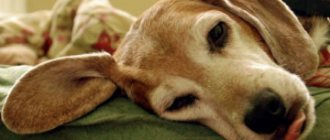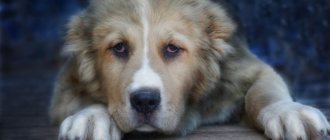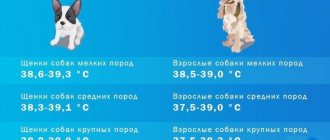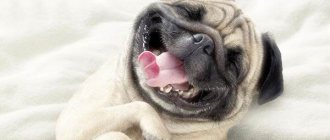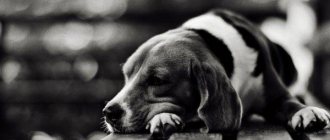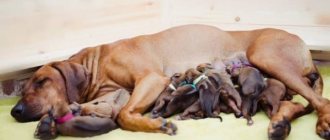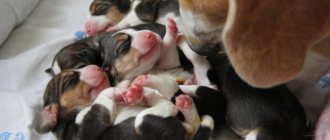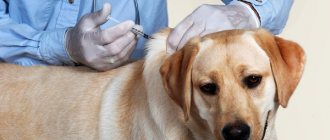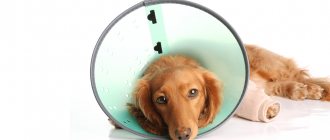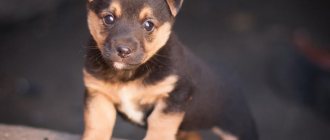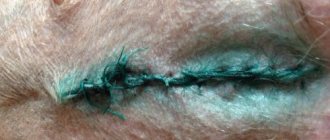The period of pregnancy, birth and feeding of puppies is a very important stage in the life of a dog. Childbirth is a serious stress for the body, so owners must understand that in the first two weeks after birth the animal needs proper care. Let us note that during the postpartum period, various complications often arise in dogs and other domestic animals. Often dog owners are faced with the problem of diarrhea in their dog after giving birth. Why does postpartum diarrhea occur? How dangerous is this condition for a lactating bitch? What to do if your pet is suffering from severe diarrhea?
Causes of postpartum diarrhea
Dogs after giving birth need systematic care and high-quality, easily digestible, balanced nutrition. Remember that the life and full development of the babies depends on the health of the mother dog. At the same time, many owners are concerned about postpartum diarrhea, which can be caused by various factors.
In the first two to three days after the birth of offspring, dogs often experience diarrhea. Indigestion often occurs due to eating placenta , although this theory of the development of diarrhea is controversial. Much depends on the individual characteristics of the body.
As a rule, feces have a liquid, watery, mushy consistency and a dark brown, greenish-brown color. There may be bloody substances in the stool. This is a normal physiological phenomenon, especially for primiparous bitches, but only if pregnancy and childbirth went without complications.
Postpartum diarrhea in animals can be caused by fermented milk products , which are present in large quantities in the diet. This can cause postpartum diarrhea.
Important! Stool upset in a lactating bitch can cause diarrhea in puppies, which is very dangerous for the health of newborn babies. Therefore, first of all, you need to establish the cause of prolonged diarrhea.
Causes of postpartum diarrhea in lactating dogs:
- a sharp change in regime and diet;
- overfeeding;
- poisoning with low-quality feed, spoiled products;
- parasitic diseases;
- helminthic infestation;
- inflammatory processes in the uterus, gastrointestinal tract;
- disruption of the digestive tract;
- malfunction of the pancreas;
- exacerbation of chronic pathologies;
- poisoning by toxins, chemicals;
- viral, bacterial diseases.
Diarrhea in nursing bitches can be caused by raw meat and offal that have not undergone heat treatment.
Often, postpartum diarrhea can occur on the 3-5th day after the birth of puppies. Most often, this phenomenon is accompanied by various symptoms. Indigestion can be caused by mastitis, endometritis, postpartum eclampsia, and other pathologies. In any case, you need to invite a veterinarian to your home to determine the cause.
Important! Do not self-medicate, as uncontrolled use of drugs can cause serious functional disorders.
As a rule, if the owner provided the dog with proper care during pregnancy, the animal is completely healthy, there are no complications in the postpartum period, and stool returns to normal on the third to sixth day.
If there is mucus, foam, remains of undigested food, or bloody inclusions in the stool, this signals the development of inflammatory processes in the gastrointestinal tract, as well as a disruption in the functioning of other internal organs.
A nursing dog has diarrhea - what are the causes?
Diarrhea itself is an absolutely normal, physiologically justified reaction aimed at cleansing the gastrointestinal tract of toxic substances and toxic products. Sometimes diarrhea can be caused by increased intestinal motility for one reason or another.
Veterinarians name many reasons for this condition in lactating bitches, ranging from severe stress and overeating to infectious/helminthic pathologies and the use of certain medications.
One of the main causes of diarrhea in mother dogs is poor diet after birth. Owners, out of strong love, feed the animal with dairy products, believing that this will increase their milk production.
Diarrhea often occurs due to overfeeding with fermented baked milk and kefir. And giving whole milk to adult dogs is generally not recommended - their stomachs and intestines do not digest this seemingly valuable product well due to the lack of special enzymes in the body.
Many owners abuse cereals, trying to save on food. Fiber, of course, is beneficial for the dog’s intestines, but in small quantities.
Excessive consumption of cereals irritates the intestinal mucosa, increasing peristalsis - hence we have diarrhea. A dog is a predator by nature, and a predator with a “bias” towards digesting carrion. Therefore, the diet of a nursing bitch should contain as much food as is natural for her body.
After the birth of the offspring, in the first days, indigestion can be caused by the bitch eating the placenta. This does not happen in every dog - it all depends on the individual characteristics of the gastrointestinal tract.
In such cases, stool with diarrhea is liquid, mushy, dark brown or greenish-brown in color. They may contain bloody substances. This phenomenon is normal, especially for primiparous dogs, provided that the pregnancy/birth was without complications.
Dangerous symptoms
Prolonged, incessant diarrhea greatly weakens the animal's body. The water-salt balance is disrupted, fluid is removed from the body, which can cause dehydration (dehydration) , as well as nutrients. Milk production decreases. The dog loses weight and the body’s resources are depleted. In some cases, the female refuses to feed and care for her offspring. If other symptoms are present in addition to diarrhea, contact your veterinarian immediately.
Alarming symptoms of postpartum diarrhea:
- a sharp increase in general body temperature by 0.5-2 degrees;
- redness, tenderness of the mammary glands;
- drowsiness, lethargy;
- vomiting, nausea, lack of appetite;
- anemia, cyanosis of mucous membranes;
- the presence of blood clots, foam, mucus in the stool;
- profuse discharge from the eyes and nose;
- purulent discharge from the loop;
- muscle spasms, cramps;
- heart rhythm disturbance, shortness of breath.
This condition negatively affects the condition of the nursing mother dog and the puppies. Babies should receive the beneficial components necessary for normal growth, development, and immunity with colostrum and milk.
A dog eating inedible objects also leads to the same consequences.
Soft ones (for example, foam rubber or rags) usually do not pose much danger and will leave the body naturally. Solid ones are quite capable of leading to blockage and injury to the intestines and lead to the need for surgical intervention.
In addition to the problems listed above, diarrhea in a dog can be accompanied by a considerable number of different viral diseases:
- infectious hepatitis;
- carnivore plague;
- parvovirus enteritis and others.
Most diseases caused by viruses are severe and have an intestinal form, accompanied by digestive disorders. These diseases pose a mortal threat to your pet and often result in death. In the best case, without the timely intervention of a veterinarian, the animal can recover, but it is unlikely that its future life will be long and joyful - viruses cause irreparable harm to the dog’s health.
Diarrhea is also accompanied by infectious processes in the intestine itself, caused by bacteria, fungi or protozoa. In addition, indigestion often accompanies non-contagious diseases of internal organs, such as pancreatitis, hepatitis, gallbladder diseases and others.
The cause of diarrhea can be metabolic disorders caused by various pathological conditions of the body, as well as a lack of vitamins or relevant microelements in feed.
Treatment
Treatment of diarrhea in lactating bitches depends on the root cause that provoked this condition. If postpartum diarrhea is caused by an unbalanced diet for your dog, adjust the diet. In the first two to three days, the dog's appetite may be reduced, so do not force feed your pet.
It is worth noting that after the puppies are born, the temperature may rise slightly. If the dog is in good health and does not refuse food, there is no need to worry. The condition will recover in a few days without any treatment.
Advice! For diarrhea in the first days after birth, keep the dog on a semi-starved diet for 12-20 hours. At the same time, do not limit your pet’s drinking.
To normalize stool and improve the functioning of the gastrointestinal tract, you can give activated charcoal, Enterosgel, Pro-coline, probiotics, and enzyme agents. Bifidumbacterin and Bifitrilak help very well with postpartum diarrhea. The drug is absolutely safe for adult dogs and small puppies. The powder is diluted in water and given to the dog 2-3 times a day, depending on the consistency of the stool.
If postpartum diarrhea is provoked by infection, viral, parasitic diseases, dogs are prescribed complex therapy, anti-inflammatory, antibacterial, antimicrobial agents, hepatoprotectors. Puppies are isolated from their mother dog for the entire period of treatment and transferred to artificial nutrition.
For severe postpartum diarrhea, Loperamide, Furazolidone, calcium gluconate, Phthalazol, Smecta are prescribed. Before giving the medicine, carefully read the package leaflet.
The dog can be given rice water, chamomile infusion, oak bark, St. John's wort, and strong sweet tea. Temporarily exclude fatty lactic acid products and raw meat that has not undergone heat treatment from the diet.
If an upset stomach in a nursing bitch provokes diarrhea in puppies, you can give the babies Enterofuril in suspension. For puppies, 1 ml of the product three times a day is enough. Treatment takes two to three days.
A dog nursing diarrhea - Rostov-on-Don
If your dog has diarrhea, the following institutions will help you in Rostov-on-Don:
- Zoodrug - here you will receive a full range of veterinary services, from high-precision diagnostics to castration of animals. Doctors are available 24 hours a day.
- Ladybug - in addition to a full range of services for the diagnosis and treatment of various pathologies, at the veterinary center you can get advice on disease prevention and maintaining animal hygiene. The clinic also employs highly qualified veterinary cosmetologists.
- Vita is a wide network of veterinary clinics, pet stores, and pharmacies. The range of services provided is wide - from fast, accurate diagnostics and the most effective treatment, to delivery of veterinary drugs to your home, and you can order any drug, even the most rarely used.
If your dog is suffering from postpartum diarrhea, feel free to contact the clinics listed above. Here they will quickly determine the cause of diarrhea and give recommendations for treatment and prevention.
Feedback from online users is full of respect and gratitude for the veterinarians working there. Animal owners note high experience, attentive attitude and love for animals, as well as a reasonable combination of price/quality of services.
If you liked our article, read other materials about dogs on the Guardian of Purity website. Stay with us!
Feeding a dog after giving birth
It is very important to follow a diet after the stool returns to normal. Feed your dog six to seven times a day in small portions. Introduce new foods into your diet gradually. Food should be nutritious and easily digestible.
In the first days, if the dog is diarrhea, limit the intake of food containing animal protein . Give ground steamed rice grains to normalize stool. As soon as the diarrhea stops, if the dog is kept on a natural diet, feed the pet boiled cereals. Give stewed, fresh vegetables, herbs, seasoned with a small amount of vegetable oil.
From the 10-12th day you can give meat, fish broths, boiled offal, raw minced meat. Alternate milk and meat feedings until the puppies begin to eat on their own. If necessary, supplement your diet with multivitamins.
Monitor the behavior and health of the dog and puppies, especially in the first week after birth. Examine your breasts daily. If you feel unwell and if postpartum diarrhea lasts for several days, contact your veterinarian immediately.
A dog nursing diarrhea in Moscow
If your dog has diarrhea, you can contact the following clinics in Moscow:
- Belanta – open 24 hours a day. This is a multidisciplinary diagnostic center with the latest equipment. There are departments of ophthalmology, endoscopy, and gastroenterology. It employs highly qualified surgeons who specialize in bloodless operations.
- Zoovet – veterinarians with a wide profile, as well as specialists specializing in a specific narrow area, are seen here. Tests can be taken at the clinic around the clock. You can call a veterinarian to your home and order delivery of medications.
- Aibolit – the institution employs specialists from all veterinary fields; you can even make an appointment with a zoopsychologist. There is the most modern equipment for instrumental diagnostics (ultrasound, ECG, UMI-V). A veterinarian comes to your home 24 hours a day.
- Chance - it is possible to carry out diagnostics in different areas (immunological, biochemical, cytological); biomaterials for research, if necessary, are taken directly at home.
Watch the video: Caring for a pregnant and lactating dog
Clinical manifestations and diagnosis
Symptoms of diarrhea in dogs are almost certainly known to every pet owner. This is a frequent act of defecation accompanied by the release of unformed liquid or semi-liquid feces, as a result of increased intestinal contractions and impaired absorption of the liquid part of food.
However, one type of feces can tell quite a lot to an experienced veterinarian. For example, black diarrhea in a dog most often occurs due to diseases accompanied by stomach or intestinal bleeding. In this case, the process takes place either in the stomach or in the small intestine, since, passing through the remaining sections, the food has time to be partially digested. It is the digested blood that gives the black color in feces. Black stool can be accompanied by such serious diseases as:
- enterocolitis;
- gastritis;
- gastroenteritis and others.
The presence of bleeding is a very alarming sign; an immediate visit to the veterinarian is vital for your pet. Symptoms of enterocolitis are often characterized by viral infections that are fatal to animals.
As a rule, these diseases, in addition to diarrhea, are accompanied by other signs: fever, vomiting, a sharp deterioration in health, lethargy, refusal to feed, and others.
Yellow diarrhea in a dog is caused by rapid evacuation of the contents of the digestive tract and insufficient digestion of food. The pigment bilirubin contained in bile has a pronounced yellow color. As the food bolus passes through the intestines, bilirubin is transformed into stercobilin, which gives the stool a brown color - this is normal. With the accelerated movement of intestinal contents, bilirubin does not have time to undergo the necessary transformations, giving feces various shades of yellow up to bright orange.
A large amount of bilirubin in the feces, among other things, indicates problems with the animal’s liver or gall bladder. Yellow diarrhea is often accompanied by a phenomenon called jaundice. It is the presence of bilirubin in the blood that causes the visible mucous membranes and non-pigmented areas of the skin to turn yellowish and is called jaundice.
Green diarrhea in a dog can be caused by a number of reasons, some of which are harmless and some that indicate a danger to the pet’s life.
Among the fairly harmless causes of green coloring of feces is the content of appropriate dyes in food or even the dog eating fresh greens. In addition, bile, released in large quantities through the bile ducts into the intestinal lumen, can give a greenish tint to feces. With rapid, accelerated passage through parts of the digestive system, bile does not have time to react with food masses and be processed by intestinal juices.
The third option poses the greatest threat - the greenish color of fecal matter can be caused by fermentation and putrefactive processes in the intestines. In particular, this is indicated by a large number of gas bubbles in liquid feces. In this case, you cannot do without antimicrobial drugs and the subsequent restoration of normal microflora with the help of probiotics.
The danger of diarrhea is dehydration. Especially in combination with vomiting. The lack of liquid part of the blood leads to its thickening, difficult movement through the vessels and poor supply of organs with nutrients and oxygen, which is fraught with the rapid development of irreversible changes. That is why it is advisable for every dog owner living in the capital to have at hand the telephone number of a 24-hour veterinary clinic in Moscow.
To make an accurate diagnosis, the veterinarian will need to collect a complete medical history, find out the type and mode of feeding of the animal, clarify the possibility of eating something outside the home, and analyze the preventive vaccinations given and their timing. After this, a clinical examination of the animal, thermometry and palpation are carried out. If necessary, X-ray or ultrasound examination is prescribed.
Laboratory tests of the animal’s feces and blood are most often crucial in making a diagnosis. Bacterial culture is carried out to identify pathogenic microflora and its sensitivity to certain groups of drugs.
How to get rid of diarrhea using traditional methods?
Before starting treatment, you need to know the exact causes of diarrhea. As a rule, in folk medicine those herbs that contain tannins are used. Here are some time-tested recipes:
- A decoction of 1 tsp will be an effective remedy. bark of young oak branches in 1 glass of water. Take 2 tbsp. l. 4 times a day.
- If there is also bleeding with diarrhea, an infusion prepared from 2 tbsp. l. blackberry leaves poured with 2 cups of boiling water. Drink half a glass 4 times a day, adding honey if desired.
- A good helper is an infusion of 1 tbsp. l. willow bark, poured 1 cup of boiling water. Take 2 tbsp. l. 4 times a day.
- When there is diarrhea after childbirth, you need to do the following: 1 tsp. pour 1 cup of boiling water over the cherry tails and keep in a water bath for about 15 minutes. Drink 1 tbsp. l. 4 times a day.
- 1 tbsp. l. crushed raspberry leaves, pour 1 cup of boiling water, leave for 30 minutes. Take 1/4 cup 4 times a day.
- Pour 6 quince leaves into 1 glass of water and boil for about 3 minutes. Drink half a glass 2 times a day.
We recommend reading: Why Vomiting After Stomach Surgery
All of the above methods are effective, but each person’s body is different. Therefore, you must remember to skillfully combine different remedies in order to quickly eliminate the cause of diarrhea without causing harm to your body.
Don't forget to wash your hands well before handling your baby. And try to be less nervous, as this can affect both milk production and cause diarrhea in the woman.
